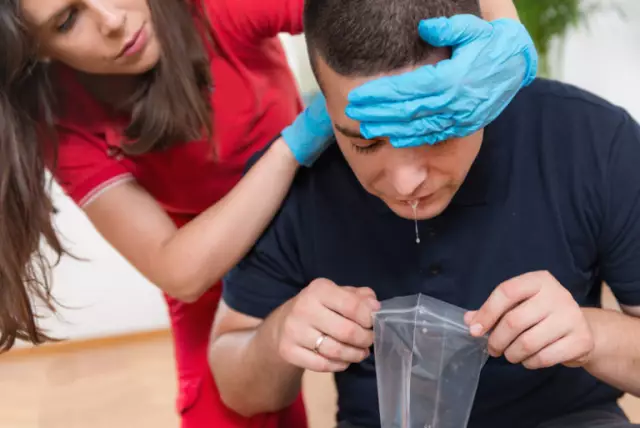- Author Rachel Wainwright wainwright@abchealthonline.com.
- Public 2023-12-15 07:39.
- Last modified 2025-11-02 20:14.
Datura poisoning
Datura, also called crazy, or devil's grass, has been known for its toxic properties since ancient times. This plant has been used in various cultures for the manufacture of potions and poisons, as well as for the manufacture of medicinal drugs. Datura is also used as a component of pharmaceuticals in modern pharmacology.

Source: depositphotos.com
Wild Datura grows everywhere, and some of its species are grown for decorative purposes - these plants have beautiful flowers.
How does Datura poisoning happen?
Datura contains alkaloids (hyoscyamine, scopolamine, atropine) - biologically active substances that have a neurotoxic effect, acting as blockers of M-cholinergic systems, i.e., their entry into the body disrupts the transmission of nerve impulses. In a small amount, Datura alkaloids are capable of providing a therapeutic effect, and in large quantities, they are poisonous.
Poisoning usually occurs when trying to self-use Datura as a therapeutic or hallucinogenic agent. All parts of the plant are poisonous, but the highest concentration of alkaloids in the roots and seeds in some species - in flowers.
Poisoning symptoms
The rate of appearance of signs of poisoning with dope depends on many factors, including the pathway of penetration of alkaloids into the body (inhalation of the scent of flowers or smoke from burning a plant, eating seeds, etc.), and on their quantity. From the moment of using dope and until the first signs of poisoning appear, it can take from several minutes to several hours.
Signs of dope poisoning:
- dry mouth;
- dilated pupils (mydriasis), increased photosensitivity up to photophobia, diplopia (double vision), impaired visibility at close range;
- increased heart rate, tachycardia;
- hyperemia (redness) of the skin;
- swallowing disorder, blurred speech;
- an increase in body temperature to subfebrile values (37.1-38 ° C);
- difficulty urinating, constipation;
- mental and motor agitation, delirium, visual hallucinations (so-called atropine psychosis);
- lack of coordination and orientation;
- convulsions, loss of consciousness.
As a rule, when poisoning with dope, blood pressure rises, but severe poisoning can lead to acute hypotension (a sharp drop in blood pressure), as a result of which cardiac activity and respiration are disturbed, up to the development of acute heart failure or paralysis of the respiratory center.

Source: depositphotos.com
First aid for dope poisoning
If you suspect poisoning with dope, and even more so if you are sure of poisoning, you should immediately call an ambulance or take the victim to the hospital as soon as possible.
First aid measures while waiting for the doctor depend on whether the victim is conscious or not. If a person is unconscious, it is necessary to provide him with free breathing by loosening tight clothes, put on his side and monitor his breathing and pulse. If breathing and pulse are impaired, it is necessary to start carrying out resuscitation measures (indirect heart massage, mouth-to-mouth breathing).
If the victim is conscious, it is necessary:
- make gastric lavage with one of the following means: saline solution (1 tbsp. l. per 1 l of water), light pink solution of potassium permanganate, unsweetened black tea, a suspension of activated carbon (30 g of crushed activated carbon per 1 l of water);
- take any enterosorbent (Polyphepan, Smecta, Polysorb, etc.);
- take a saline laxative (a saline laxative has a faster and more pronounced effect than herbal ones), for example, 30 mg of magnesium sulfate in ¼ glass of water;
- darken the room where the victim is.
It should be borne in mind that due to difficulty in swallowing in case of intoxication with dope, it is far from always possible to rinse the stomach at home and take any medicine orally. In this case, you should wait for medical help, without leaving the victim alone.
When is medical attention required?
In case of poisoning with dope, medical attention is always needed. The sooner it is provided, the greater the chances of a complete, albeit not too fast, recovery.
Help at the hospital stage:
- gastric lavage through a tube using a suspension of activated carbon and vaseline oil;
- infusion therapy, hemosorption, forced diuresis (as well as gastric lavage, it helps to cleanse the body of poison);
- the introduction of an antidote (Proserin);
- relief of psychosis.
With the development of respiratory failure, the victim is transferred to mechanical ventilation (artificial ventilation of the lungs), measures are taken to maintain cardiac activity.
Possible consequences
With timely medical care, a complete recovery occurs within a few weeks.
For some time after poisoning, mental disorders are often observed, which intensify in the evening: unmotivated fears, anxiety, memory loss. The victims are sluggish, note a feeling of weakness, impaired coordination, vision and motor skills, sleep disorders (superficial, restless, interrupted sleep). These symptoms may be accompanied by urinary disorders, disorders of bowel function, vision.
One of the characteristic complications of intoxication with dope (due to the content of hyoscyamine) is tissue trophism disorders, expressed in edema of the face, forearms, legs.
Prevention
To avoid poisoning with dope, it is necessary to abandon the use of it and preparations from it, especially handicraft, in any form. Since Datura is a danger to children, it is better to abandon its cultivation in the garden in favor of safer plants. Children should be warned that unfamiliar plants should not be used in any form, as they (as well as their smoke, aroma, etc.) can be poisonous.
YouTube video related to the article:

Maria Kulkes Medical journalist About the author
Education: First Moscow State Medical University named after I. M. Sechenov, specialty "General Medicine".
The information is generalized and provided for informational purposes only. At the first sign of illness, see your doctor. Self-medication is hazardous to health!






